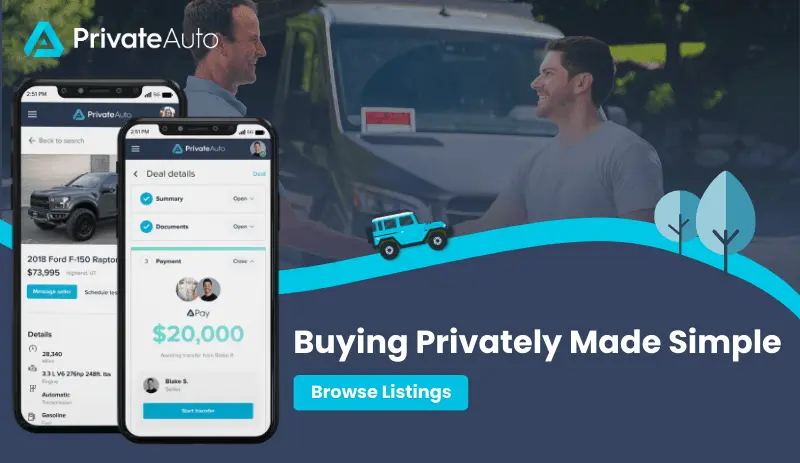Find a car
Step 1: Browse Used Vehicles Online
- Online classifieds
- National classifieds such as Craigslist and OfferUp.
- Local classifieds such as KSL Cars.
- Vehicle listing sites such as Autotrader.
- Social media listings.
- Auction websites such as Cars and Bids and Hemmings.
While these platforms help you find used cars near you, all of them lack transactional capabilities. Because they leave you to your own devices when it comes down to closing the deal, we call them “meetingplaces”.
We’re the only fully self-service tech-enabled solution for every stage of the deal.
We have nothing against other listing sites. We’re happy for you if you find your car on one of them. But we still want you to have the transactional security and convenience that our users enjoy.
That’s why DealNow was created. It allows you to start a deal on any site, and instantly transact the vehicle whenever you’re ready.
Invite the seller to DealNow and fast-track your transaction.

Agree on a price
Step 2: Car Research
We have partnered with AutoCheck to provide vehicle history reports on premium listings. AutoCheck gets its data from the following sources:
- Collision repair shops.
- Service records from maintenance facilities.
- OEM manufacturers.
- Salvage auctions.
- Car dealerships and extended warranty companies.
- Auto auctions.
- State Departments of Motor Vehicles (DMVs).
- Import and export companies
- Insurance companies.
- Vehicle inspection and state inspection stations.
- Rental and fleet companies.
Running an AutoCheck on a vehicle uncovers valuable insights into the car’s background.
- Regular maintenance (or lack thereof).
- Title history: salvage titles, junk titles, flood damage, hail damage, storm damage, fire damage, and more.
- Lien information, ownership transfers.
- Manufacturer buybacks or lemon titles.
- Collision repair history.
- Structural or frame damage.
- Service, repair, and maintenance performed.
- Total loss and reason for the loss.
- Stolen cars.
- Major repairs.
- Open recalls.
- City and state of previous registration, number of owners.
- Accidents and damage reports, stolen vehicles.
- Rental, taxi, lease, or government use.
- Emissions records.
- Odometer rollback.
- And lots more…
Take the car for a test drive
Step 3: Take the Car for a Test Drive
We keep your info secure. All communication happens through our secure messaging system. The in-app scheduler makes it easy to schedule the meetup: just select from the seller’s available times and show up at their designated location.
Step 4: Vehicle Inspection
Order a pre-purchase inspection in your PrivateAuto service hub, and a Lemon Squad inspector will come to your location.
Here are some of the things a good inspection will cover:
- Body: check for obvious damage, body panel alignment, uneven gaps, mismatched paint, and signs of damage repair. Look closely for any indications of collision repair. Check for rust underneath and around various body panels. Check headlights, brake lights, and other lights.
- Fluids: check all fluid levels, including engine oil, transmission fluid, brake fluid, power steering fluid, and coolant. Look for leaks and make sure the fluids look clean and at proper levels.
- Undercarriage: inspect the car for leaks, rust, and damage. Look at brake lines, exhaust, and suspension components.
- Tires: examine tire treads and make sure there is sufficient tread depth. Also look for any cracks, bulges, or other tire damage. Check the spare as well.
- Interior: ensure all controls, electronics, air conditioning, and heating work properly. Look for any warning lights on the dash when the car is started. Check for water damage, stains, or tears inside.
- Maintenance records: review the vehicle history report and check maintenance logs to understand repair and ownership history.
Handle paperwork
Step 5: Sign a Minnesota Bill of Sale
Here are the necessary elements in a bill of sale:
- Your full name and notarized signature.
- The other party’s full name and notarized signature.
- Vehicle price.
- The make, model, and year of the car.
- A description of the car.
- Date of the transaction.
- A warranty disclaimer stating the car is being sold as-is.
We provide an official Minnesota bill of sale as part of our standard in-app transaction process. At the appropriate stage of the transaction workflow, the buyer and seller will be asked to sign the Minnesota bill of sale electronically in the PrivateAuto app.
Pay the seller
Step 7: Sign the Official Title
Both parties need to fill out the vehicle title certificate thoroughly. The following info is required:
- Names
- Addresses
- Signatures
- Vehicle identification number (VIN)
- Damage disclosure statement
- An odometer disclosure statement (in many states)
Odometer Disclosure
You can always complete the Federal Odometer Disclosure Statement to make sure your bases are covered.
Inspect the odometer to verify that the seller’s entry is correct. Keep in mind that sellers who tamper with a car’s odometer to obtain a false reading can face serious consequences.
The PrivateAuto app has a field for the odometer reading so that both the buyer and the seller can check the mileage before moving forward.
VIN Check
The PrivateAuto app has a field for the VIN, where both the buyer and seller can check it for accuracy. This helps to eliminate errors (or the rare case of outright seller fraud).
Insure the car
Step 8: Get Auto Insurance
PrivateAuto makes it easy to compare rates and get car insurance right in our app.
Transfer ownership
Register the car
Step 9: Finalize with Minnesota DVS
They will require the following:
- Valid driver’s license.
- The vehicle title signed by the previous vehicle owner.
- Completed Application To Title/Reg. A Vehicle.
- Proof of insurance.
- Payment for the title transfer fee: $8.25.
- Payment for the filing fee: $11.
- Payment for the vehicle transfer tax: $10.
- Payment for the public safety vehicle fee: $3.50.
- Payment for the security interest assignment: $1.
- Payment for the passenger vehicle registration fee: depends on the vehicle’s base value and age.
- Payment for the wheelage tax: $10 to $20 (if applicable).
- Payment for Minnesota car sales tax (6.875% of the car’s purchase price).
- Potentially other taxes and fees, depending on your city and county of residence.
Get new license plates
Minnesota License Plates
See our state-by-state guide to license plate requirements if you’re thinking about buying or selling a car in another state.
Minnesota Vehicle FAQ
How much is the sales tax on a used car in Minnesota?
New Mexico calls their sales tax “Motor Vehicles Excise Tax” (MVET), but it’s really the same thing: a 4% tax on the purchase price or NADA value of a car.
Do lemon law protections apply to used cars in MN?
According to the New Mexico Motor Vehicle Department, you have 30 days to title and register your vehicle after purchasing it. If you fail to do so within this timeframe, a tax penalty will be imposed, and your excise tax rate will increase from 4% to 6%.
How to request a duplicate Minnesota vehicle title?c
Here are some potential MVET exemptions; contact your local MVD branch for more concrete information.
– Government vehicles: vehicles owned by the state of New Mexico or any political subdivision of the state are exempt from the MVET.
– Non-profit vehicles: vehicles owned by a non-profit organization are exempt from the MVET, provided that the organization is organized and operated exclusively for religious, charitable, scientific, literary, or educational purposes.
– Disabled veterans who have a 100% permanent and total service-connected disability and received an honorable discharge are eligible for an exemption from the MVET for one vehicle.
– Agricultural vehicles: vehicles that are used primarily for agricultural purposes are exempt from the MVET.
– Emergency vehicles: vehicles that are used by emergency services, such as fire trucks, police cars, and ambulances, are exempt from the MVET.
– Certain types of businesses: vehicles that are owned by certain types of businesses, such as farmers, ranchers, and timber companies, may be exempt from the MVET.
– Gifts. According to the NM MVD, “If a vehicle is legitimately transferred by gift, there is no sale, and no excise taxes are due. Any applicant for a vehicle title who claims that the vehicle was received by gift must submit a notarized affidavit of gift of motor vehicle or boat (MVD-10018) in which both donor and recipient affirm under oath and under penalty of perjury that the vehicle was in fact transferred as a gift.”
Helpful Resources

Brad Parker
Contributing Author
Brad Parker is the CEO and co-founder of PrivateAuto, where his dynamic entrepreneurial spirit and visionary leadership are driving the transformation of the automotive industry….

